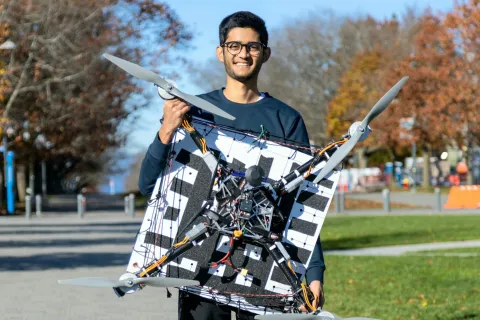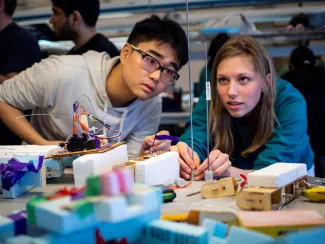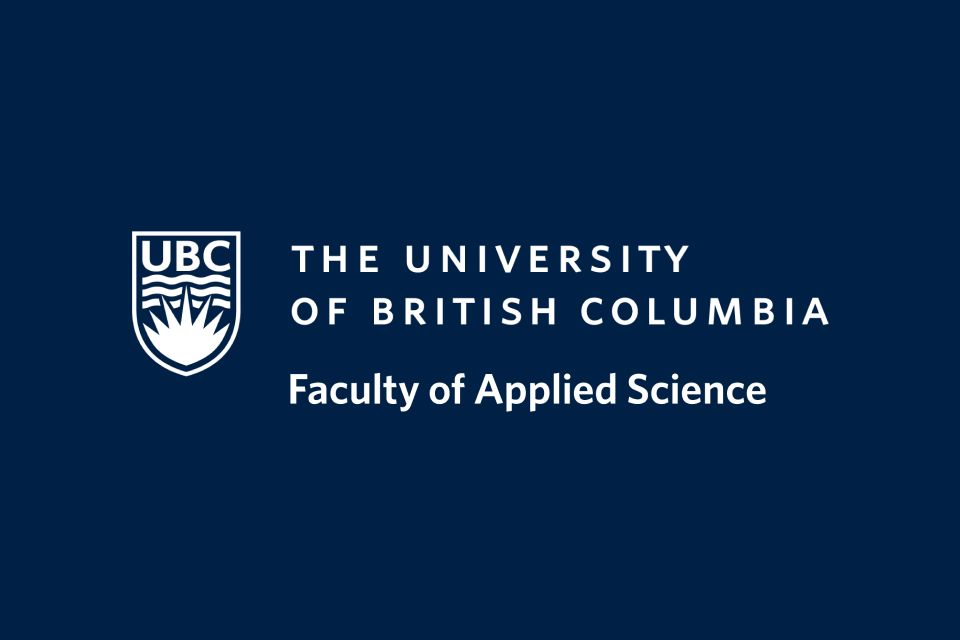"Say yes to every opportunity to learn something new! Step outside your comfort zone and the opportunities to grow are endless."

Aman Shah
- Degree:
- Bachelor of Applied Science
- Program:
- Campus: Vancouver
- Year: 4th year
I have the pleasure of being part of the IMES scholarship community which allows me to grow alongside student leaders from all over the world. I am also an aircraft designer at the UBC UAS design team where I get to work alongside 60 budding engineers to build self-flying drones that compete internationally every year. So far, I have been on two co-op terms with vastly different experiences. I had the privilege of working for a drone start-up and spending 4 months at Canada's national particle physics facility as a student researcher. Outside classes, I volunteer as a tutoring representative for the Engineering Undergraduate Society where I help first-years with their first few courses at UBC through exam tutoring sessions. Furthermore, I am a UBC Engineering Ambassador and help address queries prospective students have while applying to UBC Engineering. Finally, I recently had the privilege of joining the UBC student ambassador team where I will lead prospective student tours and represent our wonderful university.

How did you decide your current UBC Engineering discipline, or why did you choose UBC Engineering?
I have always been intrigued by how the world around us runs on a set of intricate mechanisms. This sparked an interest in engineering which developed through school projects and led me to apply to UBC Engineering. I was particularly amazed by the integration of electrical and software components into mechanical systems to form smart mechanisms and therefore I applied to the mechatronics program. I chose UBC Engineering because it has a strong emphasis on the hands-on aspect of learning which is very important. Furthermore, UBC Engineering has a curriculum that supports students through the first year to make an informed decision about their discipline of choice. The opportunity to thoroughly understand all the options before having to select one allowed me to make a well-informed choice about my discipline.
What has made your time at UBC Engineering memorable?
The experiences that have made my time at UBC Engineering memorable are the opportunities I have had to work in teams to produce hands-on design projects. Each year, we have had at least one design course where we were faced with unique design challenges that forced us to expand our skillset. The process of working through these open-ended problems with a new group of people has taught me important lessons in teamwork, leadership and critical thinking. It also gave me the opportunity to meet exceptional peers who I learned a lot from. Through design teams, I have the opportunity to spend my weekends tinkering with new technology and take charge of big projects. This opportunity to apply what we learn through hands-on involvement has been a truly rewarding aspect of the UBC Engineering experience.
Tell us about your experience in your program. What have you learned that is most valuable?
A really important lesson I have learned is that it is very important to be self-aware and take responsibility for your own goals. While there are wonderful support systems at UBC to guide you through your academics, it eventually comes down to how well you can motivate yourself to continue learning and growing every day. It is important to make a plan and form the discipline to follow it. Time management is another very important skill to master and take charge of anything you do. Everyone gets the same amount of hours a day and planning out those hours well can help you do much better in all aspects of university. Finally, the ability to both lead and be a valuable part of teams has been an important lesson since this is a requirement for any professional venture we will undertake.
What resources or events organized by UBC Engineering have helped you in your academic, professional or entrepreneurial journey thus far?
The co-op program and professional development portal have been excellent resources for professional development. Through multiple workshops, seminars with professionals and dedicated individual career coaching, the UBC Engineering Co-op office has supported me through every step of the professional development process. From cover letters and resumes, to interview preparation, to online branding, the co-op advisors truly help us shape the different aspects of our professional profile which allows us to confidently communicate our skills and experiences to potential employers. This supports a holistic development over our undergraduate degree.
What is one piece of advice you would share to a student entering UBC Engineering?
If I could give one piece of advice, it would be: take every opportunity you can to learn something new! At UBC Engineering there is an abundance of opportunities to learn both inside and outside class. It is sometimes intimidating to take these opportunities but just goes for it. Ask those lingering questions in class, join that student team that seems really cool and take on leadership positions whenever you can. Make the effort to step outside your comfort zone here because it will lead to rewarding learning experiences.
Many of today’s jobs did not exist 10 years ago, and we do not know for certain what the workforce will look like 10 years from now. How do you see the remainder of your studies in the Faculty of Applied Science preparing you for the future of work?
The engineering discipline works with cutting-edge technology and as such, its very nature is constant change. As engineers, we need to learn how to implement and adapt to changing systems. In my opinion, this is what makes this profession especially exciting since it motivates us to stay on top of our game. As I progress through my degree, I am increasingly encouraged to take charge in courses and strive to learn beyond just the syllabus. Through labs, research assignments, tutorials and group assignments, I am challenged to teach myself about current adv
ances and the future scope of the technology in that course. This self-learning aspect of courses equips us to adapt to changing technologies and industries by remaining up to date and pushing ourselves to continuously learn.



